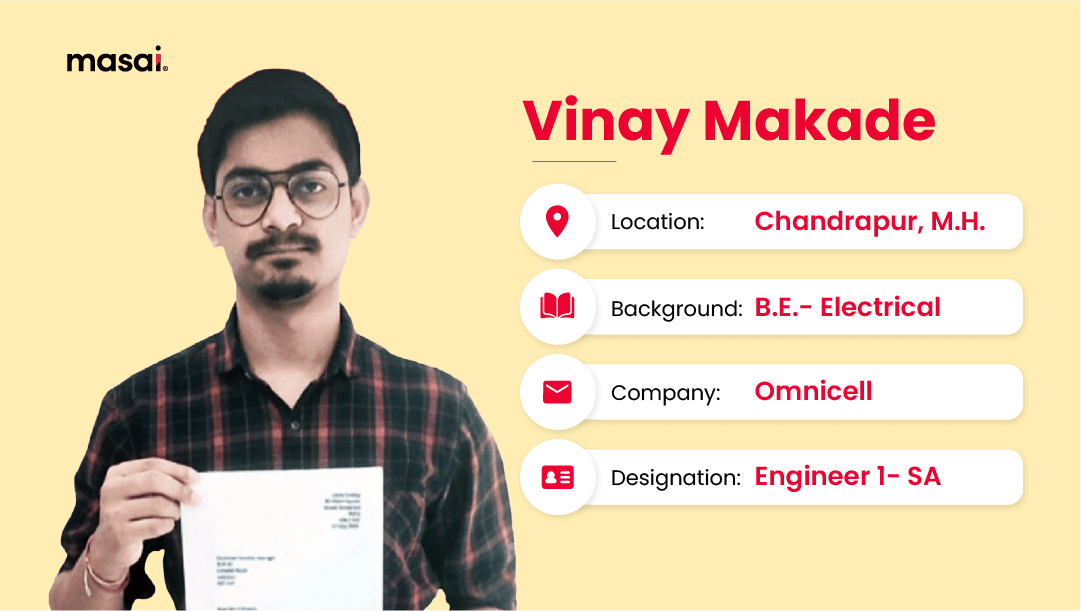How Vinay overcame his fear of Coding and became a Software Engineer
"If I'd gone for a self-learning course, I would take long breaks, there will be no structure to learning, and I wouldn't become a full-stack developer in a year, let alone 6 months."

Can anyone really learn to code? Vinay Ramesh Makade fairly answered this question when he got placed as a software engineer at Omnicell. Graduating out of SSGM college of engineering, Shegaon as an electrical engineer, Vinay was never interested in the world of software.
In fact, he admits to having a fear of coding, so much so, that he didn’t go for IT roles in companies like TCS and Infosys during his college placements.
But things changed after Vinay couldn’t find a suitable job in his core branch. What exactly happened? How did he go from electrical engineering to becoming a full-stack developer? How did he eliminate his fear?
In a recent interaction with Vinay, he answered all these intriguing questions and shared his journey with Masai.
If you also come from a non-CS background and you’re willing to get a high-paying job as a software developer, check out this full-stack web development course starting at zero upfront fee.
Here are a few excerpts from the conversation we had with Vinay-
Tell us about yourself.
I’m from Chandrapur, Maharashtra. I did my schooling in Chandrapur itself. Later I moved to Nagpur for the 11th and 12th. I was preparing for JEE mains & advanced whilst in intermediate.
I got a good enough rank to enroll in a government college in the electrical branch.
But, joining that branch was a mistake as I didn’t find much interest in electrical engineering. If I had someone to guide me, I would have chosen differently.
How was your college experience?
To be honest, I wasn’t serious about my studies for the first 3 years in college. In the 7th semester, I got super serious about my career. I studied hard that semester. In the meantime, I also started preparing for the GATE examinations.
My 8th semester also didn’t go well as COVID struck and my momentum was disrupted again.
Somehow, I graduated in the year 2020.
What did you do after college?
After college, I gave my 2nd attempt at GATE. I scored 45 marks but unluckily that wasn’t enough to get a rank under the top 1000. It meant I wouldn’t be selected for any PSU jobs, and had to start looking for other alternatives.
Did your college offer campus placements?
Yes, there were campus placement opportunities but most of them were IT-based companies hiring for IT and support roles like TCS, Infosys, etc.
Though Adani was hiring for the core branch, only 5 students got selected out of a batch strength of 70. Few of my batchmates were appearing for the IT interviews, but I had decided in the first year itself that I wouldn’t be going for those companies.
Why didn’t you go for IT roles?
Honestly, I had a fear of coding. In the first year when I came across C and C++, I couldn’t really understand anything. I thought coding wasn’t meant for me. That’s why I decided to stick to my core branch only.
How did you decide to transition from Electrical Engineering to Software Development?
After my GATE exams, I had a 2 months break until the results came. I started looking for other options at that time. Then, one of my friends introduced me to Masai School. He was learning web development at Masai back then.
He convinced me by saying – “you just need to prepare yourself mentally, everything else will work out.” After giving hard thought to it for a month, I finally decided to join Masai.
How was your first month at Masai?
Before joining Masai, I had been learning a few basic things for a month. So, the first month was like butter for me.
But I started facing issues in the 2nd unit in the DSA part. I was using a brute-force approach to solve problems, and that made things difficult.
I also lost a few sessions, and that affected me big time.
As a result, I got low scores on the DSA tests. At one point, I thought I was going to get an ASync.
But later on, I caught up and got comfortable with the concepts. That resulted in me getting into the Delta batch in the last unit. It was an amazing feeling.
What was your parents’ reaction when you told them about joining Masai?
They had their doubts when I told them about my decision. They didn’t want me to join a Bootcamp, and instead, they advised me to join TCS or any other company.
Not many people around were fully aware of Masai and they wanted me to stick to the conventional way.
But, I stayed with my decision.
Tell us about the Construct weeks. What projects did you build?
Construct week was a great experience. I went from working in a team of 2 members to working with 6 members in the last unit. So, I learned to handle both situations.
In the 2nd unit, we built a clone website of Purplle.
Later on, we built Healthkart’s front-end and back-end in the 3rd and 4th units.
And we summed it up by developing a full-stack clone of Instagram.
I made good bonds with my project partners. We’re all still in touch. Even at Masai, we helped each other whenever one of us had any issue.
(Check out some of the projects built during Construct weeks)
How similar are these clones that you build during projects?
They’re very close to the original websites apart from a few features that can only be built professionally. If you’d post something on the clone Instagram app, it will be shared and others who are connected with you can see it.
What’s your opinion on the IWY teaching method at Masai?
The I Do-We Do-You Do teaching method impacted me a lot. These things are what make Masai different.
When I used to watch coding videos earlier on YouTube, I’d forget things by the time I’d started solving a problem. But in the IWY, I had to code along with the Instructor and follow his steps right there. That made me understand things on a deeper level.
Later in the session, I would get to do the same exercise again on my own. This I Do-We Do-You Do method made me understand the concepts by heart.
How did Masai prepare you for placements?
Our 6th unit was completely dedicated to placement preparations. We got some learning resources from Masai every day to prepare for the interviews.
I faced two mock interviews with an industry mentor who was working at Amazon. So, I got an idea of how the actual interviews will be. I also had peer-to-peer interviews towards the end. That helped me become more presentable and better at solving DSA problems in a zoom online setting.
What happened during Masai Placements?
I got shortlisted by most of the companies that arrived in the first week of placements at Masai.
However, my first interview for NOVA BENEFITS didn’t go as to my expectations.
They asked a few questions about my project which I hadn’t prepared. So, it didn’t go well.
My second interview round was for Omnicell. I went fully prepared this time. They asked questions on similar lines and I answered all of them and cracked the interview. Finally, I got the offer letter from Omnicell to work as Engineer 1- Software Application.
Have you adapted well to your job? How has the experience been?
My job requires me to work on the MEAN Stack, whereas I learned the MERN stack at Masai. So, right now I’m in a probation period, learning to work on the MEAN stack.
Since I worked on my fundamentals at Masai, it allowed me to switch easily without much hassle. I learned the MERN stack in 6 months, but it took me only 20 days to switch to the MEAN stack. Masai has taught me how to approach new tech stacks and learn fast.
What’s the difference between your mentors at college vs mentors at Masai?
There’s a huge difference. The instructors and IAs at Masai were reaching out to me on an individual level.
When I got low scores on my DSA test, my IA connected with me and asked what the problem areas were. They understood the fact that I was from a non-CS background and guided me accordingly.
While, in traditional colleges, you have to approach the professors if you have any doubts. And still, it’s not certain that they would take some time out for you. They teach the whole batch and do not cater to individuals.
Is there any difference between Masai’s program and other self-learning courses available on the internet?
I think I would never be able to be a software developer in 6 months, learning from self-learning courses like Udemy or Simplilearn, etc.
I needed a performance-based course. Most of us learn well under pressure, don’t we?
At Masai, I needed to complete assignments within the deadline, there were tests to evaluate my learnings. It was a well-structured course that didn’t let me slack off or get distracted.
If I’d gone for a self-learning course, I would take long breaks, there will be no structure to learning, and I wouldn’t become a full-stack developer in a year, let alone 6 months. (Check out what students learn in the full-stack developer course at Masai)
Do Computer Science grads from colleges perform better than Masai students in your company?
Not at all. It’s the complete opposite. Masai students implement things faster than other college grads at my company. They are more confident in delivering products and giving a higher performance overall, whether it’s about tasks or communication.
We build strong fundamentals in development during the program at Masai. We do more than 1200 hours of coding, and these are the reasons we perform much better at companies.
Would you recommend Masai to any of your friends or relatives?
I have already recommended Masai to a lot of my friends. Four of them are actually studying at Masai right now. Surely, I’ll recommend it to more folks who want to build their career in the software industry.
Had he not joined Masai, Vinay would still probably be trying out his luck at GATE and other government exams. Not discrediting govt exams – but a majority of Indian students take the same route and spend years in pursuit of success. Vinay found an alternative in Masai at the right time and he’s in a much better position now. He’s got high-growth career plans, and we are excited to see him achieve many more milestones on the road ahead.

